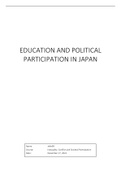Essay
Data Labs Assignment 2 (Inequality And Conflict In Societal Participation)
- Instelling
- Vrije Universiteit Amsterdam (VU)
Tweede SPSS assignment voor het vak Inequality And Conflict In Societal Participation. Beoordeeld met een 7,8. Op basis van de modellen van Persson (2015) wordt in dit paper geanalyseerd of een hoger opleidingsniveau tot meer politieke participatie leidt.
[Meer zien]




